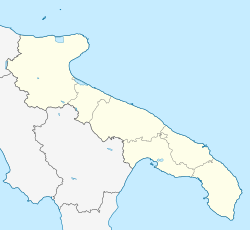
Abruzzo, historically known as Abruzzi, is a region of Southern Italy with an area of 10,763 square km and a population of 1.3 million. It is divided into four provinces: L'Aquila, Teramo, Pescara, and Chieti. Its western border lies 80 km (50 mi) east of Rome. Abruzzo borders the region of Marche to the north, Lazio to the west and north-west, Molise to the south and the Adriatic Sea to the east. Geographically, Abruzzo is divided into a mountainous area in the west, which includes the highest massifs of the Apennines, such as the Gran Sasso d'Italia and the Maiella, and a coastal area in the east with beaches on the Adriatic Sea.
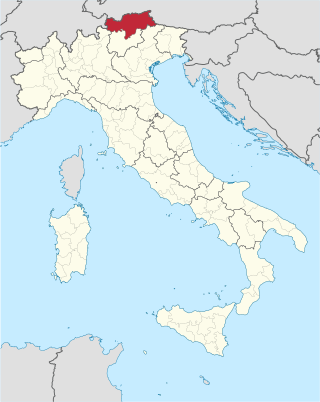
South Tyrol is an autonomous province in northern Italy. An English translation of the official German and Italian names could be the Autonomous Province of Bolzano – South Tyrol, reflecting the multilingualism and different naming conventions in the area. Together with Trentino, South Tyrol forms the autonomous region of Trentino-Alto Adige/Südtirol. The province is the northernmost of Italy, the second largest with an area of 7,400 square kilometres (2,857 sq mi), and has a total population of about 534,000 inhabitants as of 2021. Its capital and largest city is Bolzano.

Trentino-Alto Adige/Südtirol is an autonomous region of Italy, located in the northern part of the country. The region has a population of 1.1 million, of whom 62% speak Italian as their mother tongue, 30% speak South Tyrolean German and several foreign languages are spoken by immigrant communities. Since the 1970s, most legislative and administrative powers have been transferred to the two self-governing provinces that make up the region: the province of Trento, commonly known as Trentino, and the province of Bolzano, commonly known as South Tyrol. In South Tyrol, German remains the sizeable majority language.

The provinces of Italy are the second-level administrative divisions of the Italian Republic, on an intermediate level between a municipality and a region. Since 2015, provinces have been classified as "institutional bodies of second level".

A comune is an administrative division of Italy, roughly equivalent to a township or municipality. It is the third-level administrative division of Italy, after regions and provinces. The comune can also have the title of città.

Tripolitania, historically known as the Tripoli region, is a historic region and former province of Libya.

The province of Caltanissetta is a province in the southern part of Sicily, Italy. Following the suppression of the Sicilian provinces, it was replaced in 2015 by the free municipal consortium of Caltanissetta. The province contains 22 comuni. Its coat of arms is a red crest and two green leaf stems on top with a laurel leaf on the right and a crown in the middle. The River Salso is the main river of the province; it is 122 kilometres (76 mi) long and originates in the province of Palermo, and it flows into the Mediterranean in this province at the end of the Gulf of Gela.

The province of Varese is a province in the Lombardy region of Italy. Its capital is the city of Varese, but its largest city is Busto Arsizio. The headquarters of AgustaWestland, the company merged into Leonardo since 2016 and the world's largest producer of helicopters, is based in Samarate, a comune (municipality) of the province. As of 2015, it has a population of 889,410 inhabitants over an area of 1,198.11 square kilometres (462.59 sq mi). The province contains 139 comuni.
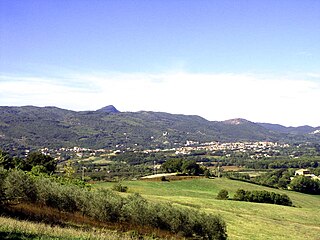
The province of Caserta is a province in the Campania region of Italy. Its capital is the city of Caserta, situated about 36 kilometres (22 mi) by road north of Naples. The province has an area of 2,651.35 square kilometres (1,023.69 sq mi), and had a total population of 924,414 in 2016. The Palace of Caserta is located near to the city, a former royal residence which was constructed for the Bourbon kings of Naples. It was the largest palace and one of the largest buildings erected in Europe during the 18th century. In 1997, the palace was designated a UNESCO World Heritage Site.

The province of Naples was a province in the Campania region of Italy.

The province of Udine was a province in the autonomous Friuli-Venezia Giulia region of Italy, bordering Austria and Slovenia, with the capital in the city of Udine. Abolished on 30 September 2017, it was reestablished in 2019 as the Regional Decentralization Entity of Udine, and was reactivated on 1 July 2020. It has a population of 530,849 inhabitants over an area of 4,907.24 square kilometres (1,894.70 sq mi).

The province of Milan was a province in the Lombardy region of Italy. Its capital was the city of Milan. The area of the former province is highly urbanized, with more than 2,000 inhabitants/km2, the third highest population density among Italian provinces, just below the densities of the provinces of Naples and of Monza e Brianza, the latter of which was created in 2004 from the north-eastern part of the province of Milan. On 1 January 2015 the province was replaced by the Metropolitan City of Milan.
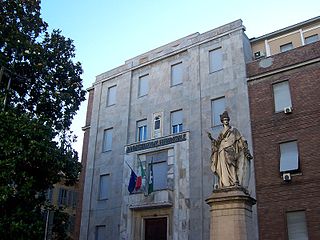
The province of Pavia is a province in the Lombardy region of Italy. Its capital is Pavia. As of 2015, the province has a population of 548,722 inhabitants and an area of 2,968.64 square kilometres (1,146.20 sq mi); the town of Pavia has a population of 72,205.

The province of Pesaro and Urbino is a province in the Marche region of Italy. Its capital is the city of Pesaro. It also borders the state of San Marino. The province is surrounded by San Marino and Emilia Romagna in the north, Umbria and Tuscany in the west, Ancona in the south and the Adriatic Sea on the east. The province has an enclave of the Umbrian commune of Citta' di Castello named Monte Ruperto. The province is also known as "Riviera of Hills". It is mostly covered by hills and is popular for its beaches.
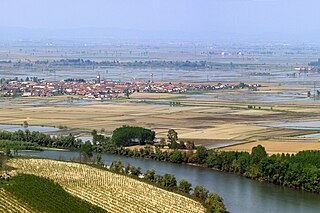
The province of Alessandria is an Italian province, with a population of some 425,000, which forms the southeastern part of the region of Piedmont. The provincial capital is the city of Alessandria.

The province of Turin was a province in the Piedmont region of Italy. Its capital was the city of Turin. The province existed until 31 December 2014, when it was replaced by the Metropolitan City of Turin.

Trentino is an autonomous province of Italy in the country's far north. Trentino and South Tyrol constitute the region of Trentino-Alto Adige/Südtirol, an autonomous region under the constitution. The province is composed of 166 comuni. Its capital is the city of Trento (Trent). The province covers an area of more than 6,000 km2 (2,300 sq mi), with a total population of 541,098 in 2019. Trentino is renowned for its mountains, such as the Dolomites, which are part of the Alps.
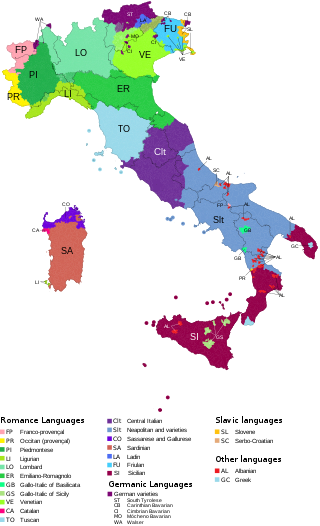
The languages of Italy include Italian, which serves as the country's national language, in its standard and regional forms, as well as numerous local and regional languages, most of which, like Italian, belong to the broader Romance group. The majority of languages often labeled as regional are distributed in a continuum across the regions' administrative boundaries, with speakers from one locale within a single region being typically aware of the features distinguishing their own variety from others spoken nearby.
Emilian is a Gallo-Italic unstandardised language spoken in the historical region of Emilia, which is now in the western part of Emilia-Romagna, Northern Italy.

The 14 metropolitan cities of Italy are administrative divisions of Italy, operative since 2015, which are a special type of province. The metropolitan city, as defined by law, includes a large core city and the surrounding suburbs and countryside closely related to it by economic activities and essential public services, as well as to cultural relations and to territorial features.


